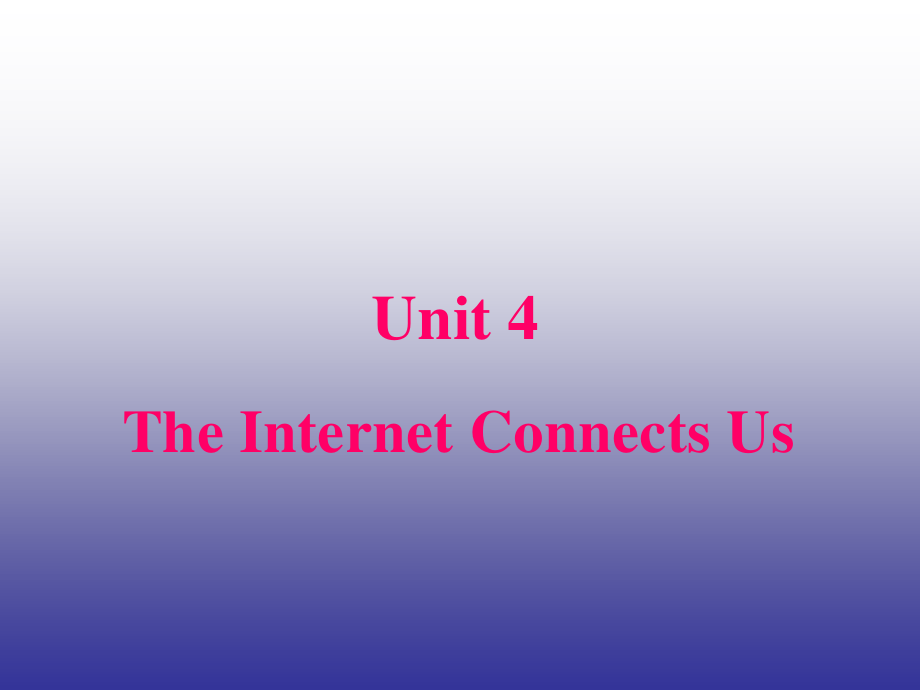《英語(yǔ)八年級(jí)下冀教版Unit 4 The Internet Connects Us課件 (共13張PPT)》由會(huì)員分享����,可在線閱讀�����,更多相關(guān)《英語(yǔ)八年級(jí)下冀教版Unit 4 The Internet Connects Us課件 (共13張PPT)(13頁(yè)珍藏版)》請(qǐng)?jiān)谘b配圖網(wǎng)上搜索����。
1����、 Unit 4 The Internet Connects Us We will learn: Functions Talking about the Internet Grammar Adverbial Clause with “if” Structures How does the Internet help you? If you have the Internet, you can learn a lot about many different topics. It is quite easy to find information on the web. Lesson 19: Ho
2、w Do You Use the Internet? Learning aims: 1. Learn about the development of the computer. 2. Know about how to use the computer. Learning important points: 1. How to connect the computer to the Internet. 2. Let the students express it in English. Learning difficult points: Some words and expressions
3����、 in the process of connecting the computer to the Internet. New Words technology tablet keyboard topic industry What can you do on a computer? How do you use the Internet? Think About It ! Language Points 1.I used to have a desktop computer, but now I have a tablet. 我過(guò)去有一臺(tái)我過(guò)去有一臺(tái)臺(tái)式電腦,但現(xiàn)在我有一個(gè)平板電腦�。臺(tái)式電腦
4、����,但現(xiàn)在我有一個(gè)平板電腦。 used to do意為“曾經(jīng)是�;過(guò)去常常”�,表意為“曾經(jīng)是�����;過(guò)去常?���!?�,表示過(guò)去存在的狀態(tài)或過(guò)去經(jīng)常做某事而現(xiàn)示過(guò)去存在的狀態(tài)或過(guò)去經(jīng)常做某事而現(xiàn)在不做了��,只用于一般過(guò)去時(shí)���。在不做了,只用于一般過(guò)去時(shí)����。used沒(méi)有沒(méi)有人稱(chēng)和數(shù)的變化。如:人稱(chēng)和數(shù)的變化�。如: He used to live in Beijing. 他過(guò)去住在北京。 (1)used to + n. / doing sth. 意為“習(xí)慣意為“習(xí)慣于于做某事”����,注意這里的做某事”,注意這里的to是介詞����,后是介詞�����,后面接動(dòng)名詞��。如:面接動(dòng)名詞�。如: He is used to traveling by t
5�、rain. 他習(xí)慣坐火車(chē)旅他習(xí)慣坐火車(chē)旅行。行���。 (2)be used to do sth. 意為“被用來(lái)做某意為“被用來(lái)做某事”�����,這個(gè)結(jié)構(gòu)表示被動(dòng)�����。如:事”����,這個(gè)結(jié)構(gòu)表示被動(dòng)����。如: This knife is used to cut bread. 這把刀子是用來(lái)這把刀子是用來(lái)切面包的�。切面包的���。 鏈接:鏈接: Exercises I. 根據(jù)所給漢語(yǔ)提示����,完成下列句子���。根據(jù)所給漢語(yǔ)提示���,完成下列句子。 1. Walk _ (向前) and you will see the white building. 2. The bridge _ (連接) the two parts of the cit
6��、y. 3. On the television _ (屏幕) we see lots of people dancing. 4. You should stop _ (喊) at the children. 5. Is there any chicken on the _ (菜單)? 6. It is easy to search for information on the _ (因特網(wǎng)). Internet forward connects screen shouting menu II. 句型轉(zhuǎn)換�����,每空一詞�。句型轉(zhuǎn)換����,每空一詞��。 1.The old woman pushes the re
7���、d button. (改為否定句) The old woman _ _ the red button. 2. What does “candy” mean? (改為同義句) Whats _ _ _ “candy”? 3. Lets have a walk. (改為反意疑問(wèn)句) Lets have a walk, _ _? 4. Remember to drive me home tomorrow. (改為同義句) _ _ to drive me home tomorrow. 5. Linda is listening to music. (對(duì)劃線部分提問(wèn)) _ is Linda _? What
8、 doing doesnt push the meaning of shall we Dont forget III. 根據(jù)漢語(yǔ)意思翻譯下列句子��,每空一詞��。根據(jù)漢語(yǔ)意思翻譯下列句子���,每空一詞�����。 2. 不要在教室里制造噪音���。不要在教室里制造噪音。 Dont _ _ _ in the classroom. 3. 你上網(wǎng)時(shí)還喜歡做些什么�����?你上網(wǎng)時(shí)還喜歡做些什么�����? What _ would you like _ _ _ the Internet? 4. 他們已經(jīng)成功地到達(dá)了山頂。他們已經(jīng)成功地到達(dá)了山頂�。 They have _ _ getting to the top of the mountain. 5. 我喜歡在網(wǎng)上聊天和別人交朋友。我喜歡在網(wǎng)上聊天和別人交朋友����。 I like _ and _ _ with _others on the Internet. chatting making friends make any noise else to do on succeeded in
 英語(yǔ)八年級(jí)下冀教版Unit 4 The Internet Connects Us課件 (共13張PPT)
英語(yǔ)八年級(jí)下冀教版Unit 4 The Internet Connects Us課件 (共13張PPT)

